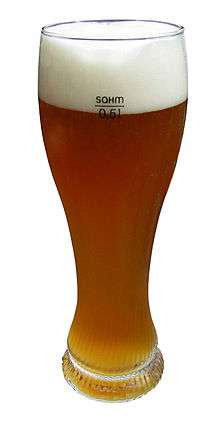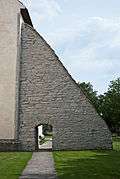Definify.com
Webster 1913 Edition
Beer
Beer
,Webster 1828 Edition
Beer
BEER
,Definition 2025
Beer
beer
beer
English

Pronunciation
- IPA(key): /bɪə(ɹ)/
- (UK) IPA(key): /bɪə/
- (US) IPA(key): /biːɹ/, /biəɹ/
- (near–square merger) IPA(key): /bɛə/
- Rhymes: -ɪə(r)
- Homophone: bier
Noun
beer (countable and uncountable, plural beers)
- (uncountable) An alcoholic drink fermented from starch material commonly barley malt, often with hops or some other substance to impart a bitter flavor.
- Beer is brewed all over the world.
- 1922, Ben Travers, chapter 1, in A Cuckoo in the Nest:
- “[…] the awfully hearty sort of Christmas cards that people do send to other people that they don't know at all well. You know. The kind that have mottoes like
Here's rattling good luck and roaring good cheer, / With lashings of food and great hogsheads of beer. […]”
- “[…] the awfully hearty sort of Christmas cards that people do send to other people that they don't know at all well. You know. The kind that have mottoes like
- (uncountable) A fermented extract of the roots and other parts of various plants, as spruce, ginger, sassafras, etc.
- (uncountable) A solution produced by steeping plant materials in water or another fluid.
- (countable) A glass, bottle, or can of any of the above beverages.
- I bought a few beers from the shop for the party.
- Can I buy you a beer?
- I'd like two beers and a glass of white wine.
- (countable) A variety of the above beverages.
- Amstel is one of the most commonly sold beers in Europe.
- I haven't tried this beer before.
Synonyms
- See also Wikisaurus:beer
Derived terms
|
Look at pages starting with beer.
Translations
|
|
|
|
Descendants
Verb
beer (third-person singular simple present beers, present participle beering, simple past and past participle beered)
- (rare, transitive) To give beer to (someone)
- Sidney Daryl, His First Brief. A Comedietta in 1870, Clement Scott, Drawing-room Plays and Parlour Pantomimes, Robson and Sons, pages 303–304:
- No doubt he then can feed us, wine us, beer us, And cook us something that can warm and cheer us.
- 2010, Steve Brezenhoff, The Absolute Value of -1, Carolrhoda Lab, page 121:
- “Beer me!” said Goody. “Also your weed is ****. Where’s the good stuff, dude?”
- 2013, Janet E. Cameron, Cinnamon Toast and the End of the World, Hatchette Books Ireland, page 124:
- I heard Patty Marsh yelling, ‘Beer him, Eleanor!’
- 2013, R. D. Power, Forbidden, page 39:
- “Beer me!” To his astonishment she obeyed his command, appearing a minute later with a glass of beer and a wry smile.
- Sidney Daryl, His First Brief. A Comedietta in 1870, Clement Scott, Drawing-room Plays and Parlour Pantomimes, Robson and Sons, pages 303–304:
Etymology 2
From Middle English beere, equivalent to be + -er.
Pronunciation
- (General American) IPA(key): /ˈbi.ɚ/
- (Received Pronunciation) IPA(key): /ˈbiː.ə/
Noun
beer (plural beers)
- One who is or exists.
- 1990, Budge Wilson, “Be-ers and Doers”, in The leaving, and other stories:
- That meant, among other things, that he was going to be a fast-moving doer. And even when he was three or four, it wasn't hard for me to know that this wasn't going to be easy. Because Albert was a beer. Born that way.
-
Derived terms
Anagrams
Dutch
Pronunciation
- Rhymes: -eːr
- IPA(key): /beːr/
Etymology 1
From Old Dutch *bero, from Proto-Germanic *berô. Compare West Frisian bear, English bear, German Bär, Danish bjørn.
Noun
beer m (plural beren, diminutive beertje n)
- bear (large predatory mammal of the family Ursidae)
- (figuratively) person who is physically impressive and/or crude
- Wat een beer van een vent daar voorin, he?
- What a bear of a guy there in front, huh?
- Wat een beer van een vent daar voorin, he?
- (student slang) debt, credit
Derived terms
- berebijt
- beregoed
- bereklauw
- berenkuil
- berenleider
- berenmuts
- berenval
- berin
- ijsberen
- brilbeer
- bruine beer
- grijze beer, grizzlybeer
- honingbeer
- ijsbeer, poolbeer
- neusbeer
- wasbeer
- zwarte beer
Etymology 2

From Old Dutch *bēr, from Proto-Germanic *bairaz. Cognate with English boar.
Noun
beer m (plural beren, diminutive beertje n)
- boar (male swine).
- A protective external construction, notably against ice or supporting the weight of the main building.
Derived terms
Etymology 3
Noun
beer m (plural beren, diminutive beertje n)
- liquid manure (excrement gathered in a pit to fertilize)
Derived terms
References
- M. J. Koenen & J. Endepols, Verklarend Handwoordenboek der Nederlandse Taal (tevens Vreemde-woordentolk), Groningen, Wolters-Noordhoff, 1969 (26th edition) [Dutch dictionary in Dutch]
Limburgish
Etymology
Related to English beer.
Noun
beer n
- beer
- any alcoholic drink
Inflection
| Root singular | Root plural | Diminutive singular | Diminutive plural | |
|---|---|---|---|---|
| Nominative | beer | bere | beerke | beerkes |
| Genitive | beers | bere | beerkes | beerkes |
| Locative | baer | baere | baerke | baerkes |
| Dative* | baerem | baerer | baeremske | baeremskes |
| Accusative* | beer | berer | beerke | beerkes |
- The dative and accusative are obsolete nowadays, the nominative is used instead.
Old French
Alternative forms
Etymology
Vulgar Latin *badō (“I am open”).
Verb
beer
- (transitive) to open
- (intransitive) to open
- (chiefly) to pant; to breathe heavily
- (figuratively) to desire; to lust for
Conjugation
This verb conjugates as a first-group verb ending in -er. This verb has irregularities in its conjugation. Old French conjugation varies significantly by date and by region. The following conjugation should be treated as a guide.
| simple | compound | ||||||
|---|---|---|---|---|---|---|---|
| infinitive | beer | avoir beé | |||||
| gerund | en beant | Use the gerund of avoir followed by the past participle | |||||
| present participle | beant | ||||||
| past participle | beé | ||||||
| person | singular | plural | |||||
| first | second | third | first | second | third | ||
| indicative | jo | tu | il | nos | vos | il | |
| simple tenses |
present | be | bees | bee | beons | beez | beent |
| imperfect | beoie, beeie, beoe, beeve | beoies, beeies, beoes, beeves | beoit, beeit, beot, beeve | beïiens, beïens | beïiez, beïez | beoient, beeient, beoent, beevent | |
| preterite | beai | beas | bea | beames | beastes | beerent | |
| future | beerai | beeras | beera | beerons | beeroiz, beereiz, beerez | beeront | |
| conditional | beeroie, beereie | beeroies, beereies | beeroit, beereit | beeriiens, beeriens | beeriiez, beeriez | beeroient, beereient | |
| compound tenses |
present perfect | Use the present tense of avoir followed by the past participle | |||||
| pluperfect | Use the imperfect tense of avoir followed by the past participle | ||||||
| past anterior | Use the preterite tense of avoir followed by the past participle | ||||||
| future perfect | Use the future tense of avoir followed by the past participle | ||||||
| conditional perfect | Use the conditional tense of avoir followed by the past participle | ||||||
| subjunctive | que jo | que tu | qu’il | que nos | que vos | qu’il | |
| simple tenses |
present | be | bez | bet | beons | beez | beent |
| imperfect | beasse | beasses | beast | beïssons, beïssiens | beïssoiz, beïssez, beïssiez | beassent | |
| compound tenses |
past | Use the present subjunctive of avoir followed by the past participle | |||||
| pluperfect | Use the imperfect subjunctive of avoir followed by the past participle | ||||||
| imperative | – | tu | – | nos | vos | – | |
| — | bee | — | beons | beez | — | ||
Descendants
References
- (fr) Godefroy, Frédéric, Dictionnaire de l'ancienne langue française et de tous ses dialectes du IXe au XVe siècle (1881) (beer)